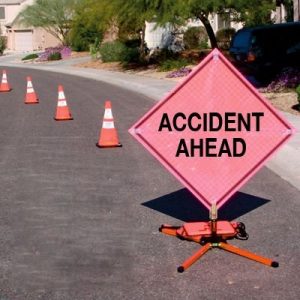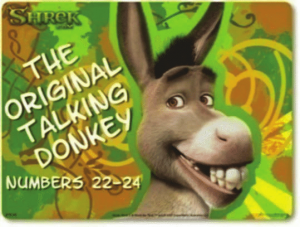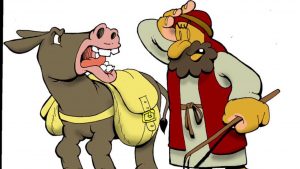Bolok 2021 – The Twilight Zone & The Ass
by devadmin | June 24, 2021 7:45 pm
Raboyseyee and Ladies:
The Twilight Zone & The Ass
 Shoin: living in times of great technological achievement, we’re well accustomed to talking cars, or navigational tools to include WAZE and others that guide our journeys, give us turn by turn directions, re-route us, and tell us to turn around and find a better, faster and safer route. Ober, long before WAZE and others told us “accident ahead” or rerouted us to road closures, in this week’s parsha of Bolok, the RBSO sent out a Malach (angel) to stop Bilham and his driver dead in their tracks. Bilham was seemingly traveling on the wrong path and on the wrong mission.
Shoin: living in times of great technological achievement, we’re well accustomed to talking cars, or navigational tools to include WAZE and others that guide our journeys, give us turn by turn directions, re-route us, and tell us to turn around and find a better, faster and safer route. Ober, long before WAZE and others told us “accident ahead” or rerouted us to road closures, in this week’s parsha of Bolok, the RBSO sent out a Malach (angel) to stop Bilham and his driver dead in their tracks. Bilham was seemingly traveling on the wrong path and on the wrong mission.

More on that below, ober let us begin with this shocker from the heylige Gemora (Sanhedrin 105a):
מר זוטרא אמר: “קוסם באמתו היה.” מר בריה דרבינא אמר: “שבא על אתונו.”
In English: Mar Zutra said: “He would divine using his phallus.” Mar the son of Ravina said: “He had intercourse with his donkey.”
Says Wikipedia: A phallus is a penis (especially when erect),[1] an object that resembles a penis, or a mimetic image of an erect penis.
Mar Zutra said what? He would divine using his what? His phallus? Amazing! And Mar, Ravina’s son, said he had intercourse with his donkey?! Who does that? About whom was the Gemora above said? In jest? And what the hec is going on here? To answer that question, the heylige Ois Googled ‘sex with a donkey’ and a few other variants; oy vey! Mamish pages full of links to sex with a donkey (page one on Google); yikes! Check out these below.
Aug 2, 2017 — A man was arrested after he was caught on surveillance camera having sex with a family’s pet donkey in Siloam Springs, according to an …
Man accused of having sex with Arkansas couple’s pet donkeys
https://www.wtvr.com › 2017/08/01 › man-accused-of-…
Avada you’re wondering why we’re discussing the phallus and donkey-sex, and it so happens that both are relevant and covered either in the parsha, the Gemora, by other luminaries, and in the medrish. Our topic this week is Bilham and his talking donkey. And while Ois readers well remember -from previous posts- that Bolok contains the famous story of the Yiddin engaging in dastardly sexual acts where certain Yiddin (about 24,000 of them) combined forbidden sex and idiolatry with the seductive Moabite shiksas which the heylige Toirah describes in the last few pisukim of the parsha, what you mistama did not know was that Bilam, the central character of the parsha, was also a shtikel deviant and pervert who used his phallus during divination and intercourse with his own she- donkey. Bestiality mamish? The bottom line: some among us act like behaymis (animals), others, act with them. Well, blow me down! More on behymo-chapping later.
The great majority of the Parshas Bolok is about two goyim, their plot to weaken the Yiddin by cursing them, and the RBSO’s role in thwarting the plan. The RBSO made sure His people would be blessed instead, and for mysterious reasons –He did not share with us- this time, a female donkey and its rider take center stage. Let’s go back and revisit this Disney-like story where animals -in this case one particular donkey- took on human instincts; it began to see and converse as if this was ordinary and expected. But is it all real? Let’s review the story as presented in the narrative.
King Bolok of Moab invites Bilham, a well-known prophet or sorcerer, to come to Moav and curse the Yiddin, who have encamped in or near his territory. His first set of messengers fail to convince Bilham to come; Bilham then asks God—with whom he communicates in dreams and visions—for permission, but God refuses. Bolok then sends another delegation of even more prominent messengers, and Bilham again responds that they should spend the night, as he must commune with God to ask permission.
במדבר כב:כ וַיָּבֹא אֱלֹהִים אֶל בִּלְעָם לַיְלָה וַיֹּאמֶר לוֹ אִם לִקְרֹא לְךָ בָּאוּ הָאֲנָשִׁים קוּם לֵךְ אִתָּם וְאַךְ אֶת הַדָּבָר אֲשֶׁר אֲדַבֵּר אֵלֶיךָ אֹתוֹ תַעֲשֶׂה.
Num 22:20 That night God came to Bilham and said to him, “If these men have come to invite you, you may go with them. But whatever I command you, that you shall do.” In light of this permission, God’s reaction to Bilham following Bolok’s delegation in the next two verses is surprising:
במדבר כב:כא וַיָּקָם בִּלְעָם בַּבֹּקֶר וַיַּחֲבֹשׁ אֶת אֲתֹנוֹ וַיֵּלֶךְ עִם שָׂרֵי מוֹאָב. כב:כבוַיִּחַר אַף אֱלֹהִים כִּי הוֹלֵךְ הוּא וַיִּתְיַצֵּב מַלְאַךְ יְ־הוָה בַּדֶּרֶךְ לְשָׂטָן לוֹ…
Num 22:21 When he arose in the morning, Bilham saddled his donkey and departed with the Moabite dignitaries. 22:22But God was incensed at his going; so an angel of the RBSO placed himself in his way as an adversary….
While Bilham doesn’t see the divine messenger (angel), the donkey does, and veers away from the angel’s sword three times. Bilham becomes angry with the donkey and strikes it, to which the donkey responds with a verbal complaint. Oddly enough, the donkey’s newfound speaking ability neither surprises Bilham nor calms his wrath. Eventually, the angel appears to Bilham, and he apologizes for his treatment of the donkey, after which the angel repeats God’s message from the dream, and Bilham continues on to meet Bolok.
 Before we further analyze this most incredible episode, we must ask at least a few preliminary questions: Why was the RBSO incensed? Did we not just read (above) that the RBSO told Bilham to go? We did! Did not the RBSO give Bilham specific permission to go? He did? What’s pshat? Next: Bilham doesn’t at all seem surprised when his donkey started talking to him! He answers the donkey as if this was a routine event, as if they talked daily. Did they? Why didn’t he and the ministers accompanying him completely freak out when it happened? Were such things normal in those days? Were there talking donkeys in the magical midbar?
Before we further analyze this most incredible episode, we must ask at least a few preliminary questions: Why was the RBSO incensed? Did we not just read (above) that the RBSO told Bilham to go? We did! Did not the RBSO give Bilham specific permission to go? He did? What’s pshat? Next: Bilham doesn’t at all seem surprised when his donkey started talking to him! He answers the donkey as if this was a routine event, as if they talked daily. Did they? Why didn’t he and the ministers accompanying him completely freak out when it happened? Were such things normal in those days? Were there talking donkeys in the magical midbar?
Of course, this question and many others were previously asked and answered by many a sage and let’s see what a few had to say. Says the Rashbam, azoy: the RBSO was angry with Bilham though He had permission to go because his intentions were bad.
“כי הולך הוא”—ברצון, מתאוה לקללם, אף על פי שהיה יודע שאין הקב”ה רוצה.
“At his going”—willingly, with a yearning to curse them, even though he knew that the Holy One, blessed be He, does not want [them cursed]. Other commentators suggest that Bilham believed the RBSO would change His mind and allow him to curse the Yiddin. The text itself, however, gives no hint of Bilham’s sinful intentions or any example of his attempt to convince the RBSO to change His mind. What to do if there is no proof of Bilham’s bad intentions? Not to worry: bad intentions can always be planted. In fact, wait until we read what the heylige Gemora and medrish have to say about him.
 Then again, avada it’s possible that Bilham was so shocked to hear his donkey talking that he pished in his hoizen (peed his pants). Did he? We don’t know. Ober, and as the heylige Ois has told you over and again, it’s the RBSO’s Toirah and only He decided what goes in and what remains unsaid. Was every detail revealed? Efsher He but wanted the Gemora, the medrish and later generations – to include us- to sit, discuss and argue over what went down. Who says the RBSO needed to tell us every detail? Could it be that the Toirah only records what Bilham said after he changed his soaked pants? Why not? And before you shoot down this theory as ludicrous and less, wait until you read what the Gemora has in store for Bilham’s reputation. In any event, what we know is this: Bilham responds right away, as if he were talking to any other person. On the other hand, says the medrish (Bamidbar Rabbah 20:12) that taka Bilham and those accompanying him were mamish in shock over “the miracle that there was never like it ever before.” Bilham however, apparently took it in stride.
Then again, avada it’s possible that Bilham was so shocked to hear his donkey talking that he pished in his hoizen (peed his pants). Did he? We don’t know. Ober, and as the heylige Ois has told you over and again, it’s the RBSO’s Toirah and only He decided what goes in and what remains unsaid. Was every detail revealed? Efsher He but wanted the Gemora, the medrish and later generations – to include us- to sit, discuss and argue over what went down. Who says the RBSO needed to tell us every detail? Could it be that the Toirah only records what Bilham said after he changed his soaked pants? Why not? And before you shoot down this theory as ludicrous and less, wait until you read what the Gemora has in store for Bilham’s reputation. In any event, what we know is this: Bilham responds right away, as if he were talking to any other person. On the other hand, says the medrish (Bamidbar Rabbah 20:12) that taka Bilham and those accompanying him were mamish in shock over “the miracle that there was never like it ever before.” Bilham however, apparently took it in stride.
Says Rabaynu Bechaye, azoy: the RBSO performed such an extraordinary miracle specifically in order to shock Bilham. He wanted to wake Bilham up, so to speak, so that he would realize just how much of an effort was being made to arrest his travels. Bilham should have realized from the unusual activity that the RBSO did not want him to go. But Bilham, due to his cruel, wicked nature and his strong desire to curse the Yiddin took no heed. He responded to his donkey almost without flinching and moved on. The bottom line: Bilham was a bad guy!
Says the same medrish that the RBSO performed such a great miracle in order that Bilham realize that the ability to speak is a gift from above. He can grant it even to a beast if He so desires, and He can remove it from a human if that human opposes His will. Bilham should have understood this and realized he will never be able to curse Israel against God’s will. But this message too was lost on Bilham, who in his wicked zeal would not be stopped. (See also Seforno to 22:28).
Ober, do all agree? Not! Says the Rambam in his Guide to the Perplexed (Moireh Nevuchim), that such Biblical stories as talking donkeys (see 22:28-30 of our parsha), or talking snakes – “The serpent said to the woman, ‘You surely will not die!’” (Bereishis 3:4-5), the fellow who seduced Chava– must be interpreted allegorically, not literally. Donkeys and snakes don’t speak, which precludes a literal interpretation of these verses. Rather, according to the Guide, these were visions. Bilham was mamish sleeping. Well, blow me down! It was all but a dream Bilham had. Is that what they taught us in yeshiva? Not!
One more time: the Rambam famously asserts that this “dialogue” did not occur in reality and that the entire narrative of Bilam and his donkey, took place in a prophetic dream. He denies the possibility of a conscious, real-life encounter with malochim (angels). Of course not: have you ever met a malach? Moreover, we are taught that the appearance of speech of an angel mentioned in heylige Toirah (to include Tanach), -with the exception of Moishe who had direct contact- always took place in a vision or dream. It makes no difference whether this is expressly stated or not; that’s just how it is and fartig, case closed! In some cases the account begins by stating that the prophet saw an angel; in others, the account apparently introduces a human being, who ultimately is shown to be an angel; but it makes no difference, for if the fact that an angel has been heard is only mentioned at the end, you may rest satisfied that the whole account from the beginning describes a prophetic vision. As an aside, Maimonides applies this same principle – and controversially so – to a number of Biblical narratives that appear, on the surface, to speak of actual events, rather than prophetic visions. He boldly interprets the story of Avrohom’s three visitors (Bereishis 18) and the account of Yaakov’s struggle against a mysterious assailant (Bereishis 32:24-32) as referring to prophetic visions experienced by the respective patriarchs. Is that what we were taught in yeshivas? Not!
Does everyone agree? Of course not! Says the Ramban (Nachmanides), that it’s mamish not so: Avrohom did encounter three real angles. And he says azoy: “That which happened to Bilam on the way, and the speaking of the donkey, took place in a prophetic vision, since further on, in the same account, an angel of God is introduced as speaking to Bilam.” Ober says the Maharal (aka: the Gur Aryeh, famous for his Golem), azoy: the Rambam is wrong! He insists on the literal interpretation of the story of the talking ass. Asses talk! Some say they also have opinions. Ober listen to this: surprisingly, he agrees with the Rambam that the primordial serpent did not speak with Chava (Eve). What’s pshat? Why does he believe that a tuchis can talk but a snake cannot? Given that the Maharal was a literalist, he should have applied this approach across the board; if an ass can speak, why not a serpent? And the answer? Ver veyst?
And before we go veyter, let’s check out a very famous and oft-quoted Mishneh from (Pirkei Avos 5:6) where we see this: “Ten things were created on the eve of shabbis, at twilight (bein hashmashos). They are the mouth of the earth; the mouth of the well; the mouth of the donkey; the rainbow; the Manna; the staff; the Shamir; the alphabet; the inscription; and the Tablets.”
The donkey in this Mishneh refers to Bilham’s ass who speaks. “And G-d opened the mouth of the ass, and she said…” (our parsha 22:28). Ober listen to this: just above we mentioned that the Rambam in his Guide for the Perplexed, states emphatically that the ass speaking was just a vision, however in his commentary on the Mishneh, the same Rambam states precisely the opposite: that Bilham’s ass did speak and to prove that, he quotes the above Mishneh. But how is this Mishneh a proof that Bilham’s ass actually spoke? The Mishneh seems to be telling us that the RBSO created the miraculous speaking mouth of Bilham’s ass when He created the world. As an aside, if that Mishneh is emes and of course it is, by definition there is nothing inherently miraculous about a speaking donkey—this possibility was created ab initio, from the “get-go”. Was the ass-talking donkey then not such a big deal? Says the heylige Ois, azoy: of course, it was a miracle but efsher a slightly different one. It’s taka emes that her mouth was created on erev shabbis, and that her mouth was in a perpetual state of being able to speak and not being able to speak; the twilight zone. One miracle could be that she spoke at the right place and at the right time, just when the RBSO wanted to teach Bilham some humility. An efsher bigger miracle was that any mouth, human or animal, with the ability to speak, but did not for several thousand years. OMG! In our times, such miracles cannot be found. Every tuchis speaks up and quite often. Another bottom line: things created bein-hashmosis have unique properties and abilities.
 Based on the Mishneh, we can understand the nature of the dispute between the Rambam and the Maharal who disagrees with the Rambam and maintains that the donkey actually spoke. Efsher we can further kler azoy: animals born on or during the third day of creation cannot speak and that would include the serpent. Not to worry; the snake has other abilities, if you chap. Only things created bein-hashmosis, to include the mouth of the ass, have unique abilities to speak and do wonderous things; that’s why the RBSO created them at that time. Remember that the phrase “twilight zone,” is used to describe surreal experiences.
Based on the Mishneh, we can understand the nature of the dispute between the Rambam and the Maharal who disagrees with the Rambam and maintains that the donkey actually spoke. Efsher we can further kler azoy: animals born on or during the third day of creation cannot speak and that would include the serpent. Not to worry; the snake has other abilities, if you chap. Only things created bein-hashmosis, to include the mouth of the ass, have unique abilities to speak and do wonderous things; that’s why the RBSO created them at that time. Remember that the phrase “twilight zone,” is used to describe surreal experiences.
Shoin, whether or not the donkey’s tuchis spoke or not, ver veyst? Greater people than most of you and certainly me, have debated this topic for generations and what we know is this: we don’t know! One thing is zicher: whether his ass spoke to him while awake, or but appeared to talk in his dream, Bilham gets a bad rap. And when the heylige Gemora does not like someone, watch out below. Let’s get back to that shtikel quote from page one. Says the heylige Gemora -which dedicates more than a few lines to him- in Sanhedrin 105a and b, azoy:
קוסם באמתו היה כתיב הכא נופל וגלוי עינים וכתיב התם (אסתר ז, ח) והנה המן נופל על המטה וגו’ איתמר מר זוטרא אמר קוסם באמתו היה מר בריה דרבינא אמר שבא על אתונו מ”ד קוסם באמתו היה כדאמרן ומ”ד בא על אתונו היה כתיב הכא (במדבר כד, ט) כרע שכב וכתיב התם (שופטים ה, כז) בין רגליה
And in English: The Gemora relates: Bilham was a diviner by using his penis. It is written here: “Fallen, yet with opened eyes” (Bamidbar 24:4), and it is written there: “And Haman was fallen upon the divan whereupon Esther was” (Esther 7:8), indicating that the verb fallen has sexual connotations. It was stated that there is an amoraic dispute with regard to this matter. Mar Zutra says: Bilham was a diviner by using his penis. Mar, son of Ravina, says: He engaged in bestiality with his donkey. The one who says that he was a diviner by using his penis derives it as we stated. And the one who says that he engaged in bestiality with his donkey derives it as follows: It is written here: “He crouched, he lay down” (Bamidbar 24:9), and it is written there: “Between her legs כרע נפל שכב וגו he sunk, he fell, he lay” (Judges 5:27), which is interpreted as a reference to sexual intercourse between Sisera and Jael.
Veyter in the heylige Gemora which says azoy: Balaam describes himself: “And he knows the knowledge of the Most High” (Bamidbar 24:16), and the Gemora asks: Now, if the knowledge of his animal he did not know, is it possible that the knowledge of the Most High he knew? The Gemora explains: What is the meaning of the knowledge of his animal? The princes accompanying him said to him: What is the reason that you did not ride horses? Balaam said to them: I brought the horses to graze in the pasture and rest there.
The donkey said to him: “Am I not your donkey” (Bamidbar 22:30)? Balaam said to the donkey: Merely for burdens, not for riding. The donkey said to him: “Upon which you have ridden” (Bamidbar 22:30). Balaam said to the donkey: That was mere happenstance and is not a regular occurrence. The donkey said to him: “Your whole life until this day” (Bamidbar 22:30).
ולא עוד אלא שאני עושה [לך] מעשה אישות בלילה כתיב הכא (במדבר כב, ל) ההסכן הסכנתי וכתיב התם (מלכים א א, ב) ותהי לו סוכנת
The donkey continued: Moreover, I perform a conjugal act for you and we engage in bestiality at night. From where is this derived? It is written here: “Was I ever wont [hahasken hiskanti] to do so to you” (Bamidbar 22:30)? And it is written there with regard to Abishag the Shunammite: “And let her be a companion [sokhenet] to him” (I Kings 1:2). Just as the root samekh, kaf, nun indicates sexual relations in the case of Abishag, the same is true with regard to the donkey. Balaam was unable to best his donkey in a debate.

The bottom line: the heylige Gemora does not like Bilham and has all sorts of nasty things to say about him. Were these allegations emes? Ver veyst? What we know with certainty is this: somehow and somewhere, the RBSO chose to engage with Bilham. He and his talking ass were selected as the mediums to do the RBSO’s bidding. Not too shabby for a fellow who may have used his phallus when divining and also of course when taking his ass from behind. Shoin!
A gittin Shabbis!
Yitz Grossman
The Oisvorfer Ruv
Source URL: https://oisvorfer.com/bolok-2021-the-twilight-zone-the-ass/